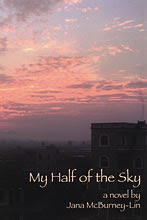Jana McBurney-Lin
My Half of the Sky by Jana McBurney-Lin was published two years ago (the paperback has just been released) and I should have read it then. I owned it—in fact I had two copies because I bought one and the author sent me one—but I was foolishly intimidated by its 500 pages. But I have now read it, and I enjoyed it thoroughly. I hope that this review, coinciding with the publication of the paperback edition, will make up for my tardiness.
Li Hui is a young college-educated woman, the only child of typical Chinese parents in a “small” Chinese town of just a million residents. Because of the country’s one-child policy, her parents have no sons, leaving Li Hui to take care of them in their old age. Which would be problematic enough, but the father has a gambling problem, which soon places a burden also on Li Hui. Although qualified to teach elementary school, out of filial duty she returns to the village and takes the only job she can get—as a clerk in a tea shop. She is bright, so of course she excels. She’s also attractive, and so she comes to the attention of a handsome laborer, whom, the reader knows, will not be approved by the parents, even if other obstacles are overcome (such as Li Hui’s suspicions). Meanwhile, the parents have, in traditional fashion, arranged a marriage for Li Hui, although in this case it is with a professor who works in Singapore. [This development I found quite interesting because I knew the author when we both lived there.] In the interest of preserving the plot for readers I won’t go further, but there are, of course, wonderful complications, especially in the form of two fantastic characters: the professor’s mother and the American wife of the professor’s colleague.
The story by itself is completely engaging. The reader identifies and easily sympathizes with Li Hui, so every challenge to her is taken personally. On top of that, though, the entire book is a painless lesson in Chinese culture, including customs, food, folklore, living conditions, the role of women, tea, poverty, etc., as well as in the oddity that is modern Singapore. Instead of this information being force-fed in exposition, it all comes out beautifully and naturally as the story itself progresses. Li Hui is living these issues, and so the reader is able to see them. (This is one reason, I think why the book is as long as it is, and also the reason why the pages fly by so easily.)
In the end, the novel suggests some subtle challenges both to Chinese traditions and to American culture, as well as Singaporean rigidity. Lee Sa, the American wife of the professor’s colleague, is portrayed as brash and thoughtless. But even she is tempered through Li Hui’s quiet example. And although Li Hui’s future isn’t completely clear, the reader does understand that she isn’t going to be a doormat for her father any longer. She plans to control her own destiny, whatever that may be.
I regret that I didn’t read the book until now, but I can whole-heartedly recommend it to anyone interested Asia or, for that matter, in a good story about a woman searching for her way in the world.


>Bless you for this review. As a reader, the publisher of first-time novelists and the editor that actually raised the word count to allow for the flow of the story that you praise here, I am grateful to see this recognition of book and author. The book indeed is a striking read and a memorable entry into modern Chinese life. I love the book.
‘
Because I am the publisher you could dismiss my praise as self-promotion, but small publishers can’t afford to publish anything we don’t totally believe in. So my gratitude is both as publisher and reader … I am truly both.
>I thought you might be interested in knowing that the author, Jana McBurney-Lin, has very graciously shared her recipe for Jana’s Fried Rice on my blog (www.queenofthecastlerecipes.com). Any book clubs who are discussing My Half of the Sky might want to whip up a quick batch to share at their next book club meeting. It’s delicious.